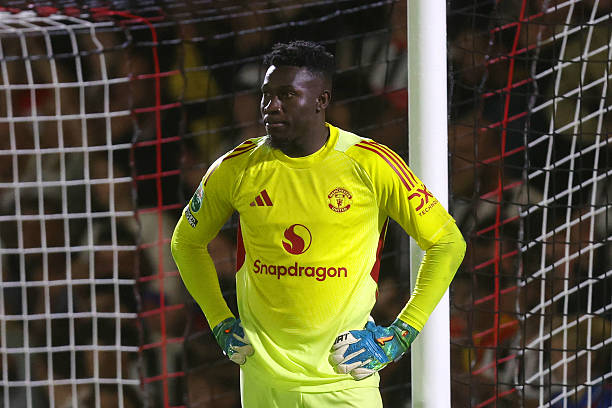It is often said that the Manchester United shirt is one of the heaviest in football. For goalkeepers, the weight can feel crushing. Andre Onana’s experience since joining the club has underlined just how unforgiving the role can be — and why the debate over United’s number one remains one of the club’s most pressing concerns.
Signed for £47m from Inter Milan in 2023, Onana arrived with the reputation of being among the world’s finest modern goalkeepers, admired for his confidence on the ball and ability to dictate play from the back. Even Edwin van der Sar, who monitored him closely at Ajax, was convinced of his elite talent. Yet within months of his Old Trafford debut, questions swirled about his suitability, mistakes crept in, and the crowd’s faith began to fracture.
Onana himself admitted to BBC Sport before the 2024 FA Cup final that the fall was bewildering: “I arrived as the best goalkeeper in the world and boom, it went down. It was like, what happened?” What happened, in part, was a tactical shift. Expected to build from the back, he was soon forced to go long after a costly preseason blunder against Lens dented confidence in his style. Errors followed in competitive fixtures, and the aura of reliability evaporated.
Public criticism sharpened the spotlight. When Onana declared United were “way better” than Lyon in last season’s Europa League quarter-final, Nemanja Matic — a friend of David de Gea — pounced, calling him “one of the worst goalkeepers in the club’s history.” Onana made two mistakes in the tie, and though he played in the semi-final and final, it was clear that trust inside the club was waning.
Ruben Amorim’s arrival as manager brought no reprieve. This season, Altay Bayindir has been given the gloves in the Premier League, despite his own wobbles against Arsenal, Burnley, and Fulham. United even paid £18m for 23-year-old Senne Lammens, preferring long-term potential over the experience of World Cup winner Emiliano Martinez. Onana, meanwhile, is edging towards a loan move to Trabzonspor, reduced to a solitary Carabao Cup outing in which he again erred.
For Amorim, the problem is stark: stick with Bayindir, a deputy still prone to nerves, or expose Lammens to the intensity of a Manchester derby debut. The choice is made harder by the reality that at United, every mistake is magnified. “To be the number one at United you need to have rhino skin,” Phil Jones, the former defender, explained. “If a goalkeeper makes a mistake, it becomes infectious very quickly and spreads through the defensive unit.”
Jones recalls David de Gea, who overcame a shaky start to win four Player of the Year awards. His secret, Jones believes, was an ability to detach from criticism. “It is ruthless, but he had this ability not to care. He was blasé about errors, even in training. But when you needed him, he was there.”
Others were less fortunate. Roy Carroll, who played 72 times for United and lifted the 2004 FA Cup, admits his career is often reduced to one mistake — failing to keep out Pedro Mendes’ long-range strike against Spurs. “I laugh about it now, but at the time I was upset,” he said. More than technical ability, Carroll stresses the importance of mental resilience and support, admitting he battled depression during his career.
This is the paradox of being a United goalkeeper. You can win titles, make spectacular saves, even be among the best in the world. But a single error risks defining you. Onana is the latest to feel that pressure. Whether Bayindir or Lammens can withstand it will go a long way in determining how stable United’s season becomes.
For now, the position remains one of the club’s heaviest shirts to wear — and one of its most unforgiving tests.



